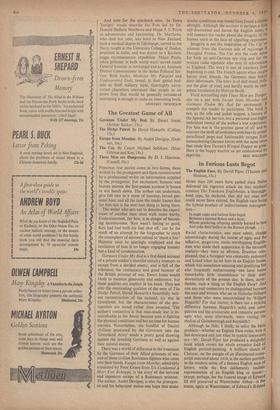The Greatest Game of All
Germans Under My Bed. By Ewart Jones. (Arthur Barker, 15s.) PERSONAL war stories come in two forms, those written by the protagonist and those reconstructed by a professional writer on information supplied by the protagonist. For excitement, humour and human interest the first-person account is bound to win hands down. The author can understate, give full rein to a sense of humour, reveal per- sonal bias; and all the time the reader knows that for him this is the next best thing to being there.
The writer who sets out to describe the experi- ences of another man must walk more warily. Understatement, for him, is in danger of becom- ing facetiousness. 'Ken wasn't feeling so good, Ken had had both his feet shot off,' can be the result of an attempt by the biographer to catch the atmosphere of aircrew refusal to 'shoot a line.' Humour must be sparingly employed and the revelation of bias is no longer engaging honesty but a kind of condemnation.
Germans Under My Bed is a first-hand account of a private soldier's cheerful unlucky attempts to escape from a derided enemy, and is full of the tolerance, the contumacy and good humour of the British prisoner of war. Ewart Jones would blush to mention generosity and endurance; but these qualities are implicit in his book. They are also the outstanding qualities of the men of The Sledge Patrol, David Howarth's beautifully writ- ten reconstruction of the isolated, icy war in Greenland; but the characteristics of the pro- tagonists are stated rather than revealed. The author's contention is that man-made war is in- conceivable in the Arctic because man is fighting the physical conditions and has no time for human enemies. Nevertheless, the handful of Danish civilians promoted by the Governor into the 'Greenland Army' made a pretty good showing against the invading Germans as well as against their natural enemy.
There was a world of difference in the treatment by the Germans of their Allied prisoners of war and of those civilian Resistance fighters who came into their hands. Escape from Mon hue, admirably translated by Peter Green from Un Condamne a Mort S'est Echappe, is the story' of the survival and ingenious escape of a Resistance prisoner. The author, Andrd Devigny, is also the protagon- ist and his behaviour makes one hope that under
similar conditions one would have found a similar strength. Although the account is perhaps a little self-dramatised and heroic for English tastes, it will reassure the reader about the integrity of the human spirit in the face of appalling oppression. Integrity is not the inspiration of The Cat, an account from the German side of espionage in Occupied France. The Cat was the code name for both an anti-German spy ring and for the woman radio operator who sent its information to England. The story is one of treachery from beginning to end. The French agents when caught betray their friends, the Germans then betraY their informants. The story is of dull Metal, with- out the glint of steel, and hardly worth its com- petent translation by Mervyn Savill.
Vivid storytelling puts These Men are Danger' ous on a par with Escape frotn Montluc and Germans Under My Bed for excitement. It compels the reader to participate. The book ig not, as the title and jacket suggest, a history of the Special Air Service, but a personal and highlY individual record of the author's war experience. For him war is 'the greatest game of all' and he conveys the thrill of ambushes with heavily armed parachuted jeeps and hairbreadth escapes from outnumbering German forces with the same verve that made Roy Farran's Winged Dagger so good. Here is the happy warrior as yet unshadowed bY






















































 Previous page
Previous page